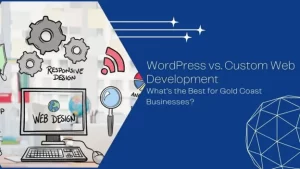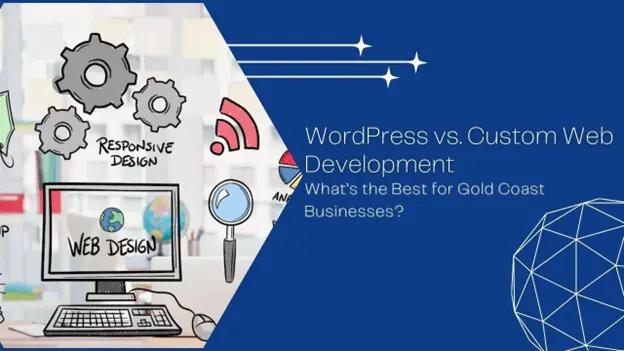Since everything is transforming into digital, it is necessary for businesses to come online and build a strong presence. To create this presence, the very first step is to launch an eye-catching website. However, it is easier to say than done because a debate sparks, which is to choose either WordPress or a custom web development alternative. However, both approaches are excellent and have their own upsides and downsides.
This post will introduce you to the pros and cons of these alternatives. After reading this post, you will be equipped to make informed decisions. Let’s get started to understand everything about WordPress.
What is WordPress?
WordPress is indeed worldwide popular as an efficient content management system (CMS) that enables users to design and manage websites without writing codes from scratch. Undoubtedly, it has gained popularity as a blogging platform. Gradually, it evolved into a versatile platform that hosts over 40% of global websites. Its obvious reason is its user-friendly interface, full authority to tailor its themes, integration plugins, etc. Overall, it is the most impressive user-friendly interface for hosting multiple types or sizes of businesses.
Now, let’s explore how good it is.
Pros of Using WordPress
Statista reveals that the total number of websites worldwide is over 1.88 billion, with a significant portion of WordPress sites. Multiple positive aspects of these sites are the reasons behind it.
- Ease of Use: WordPress comes with a user-friendly interface, which minimally requires technical skills or expertise to navigate the platform. Also, users need not be technically sound to create content and manage websites effectively.
- Cost-Effective: This web-building platform is economical, which small to medium-sized businesses can afford easily. It comes up with free and premium themes or layouts with multiple plugins. SMEs or any business can attain a professional website without the need to break the bank.
- SEO-Friendly: WordPress is integrated with SEO guidelines. These features easily allow search engines to crawl and index web pages. For optimisation also, numerous plugins are available to easily integrate with it and enhance SEO efforts to attain visibility quickly online.
- Community Support: This is actually an open-source platform, which enables a vast community of users or developers to use it. Instead of exploring YouTube, forums, or other sources, one can find end-to-end assistance via tutorials and resources here easily. The effortlessness minimises the battle to troubleshoot and optimise the website efficiently.
- Scalability: This versatile CMS can be scaled as a business grows. Simply put, you can start small from here and expand while using its plugins and incredible features.
Cons of WordPress
A few downsides overlap with the popularity of WordPress. Let’s discover its limitations below.
- Customisation Constraints: It is true that WordPress introduces multiple predesigned layouts and plugins. But sometimes, these resources become less customizable. Businesses with particular requirements may struggle to achieve the expected functionality on it.
- Security Vulnerabilities: Since it is a widely used CMS and web developers understand its complexities, they know the loops. So, hacking on this platform is common. Without proactive management and security measures, entrepreneurs may not keep it secure and safe.
- Performance Issues: Overloading this website with lots of plugins can hamper its uploading speed. This will certainly require significant downtime. Neglecting it can lead to compromising on its speed and eventually, user experience and SEO benefits.
What is Custom Web Development?
Custom web development involves designing and developing a website from scratch. It is tailored specifically to a business’s unique requirements. This process typically requires professional developers and designers who can create a site that meets specific functionality and design needs.
Pros of Custom Web Development
Like WordPress, tailored web development has its own benefits, which are shared below:
- Tailored Solutions: A tailored web layout offers scope to integrate end-to-end functionality according to expectations. Simply put, this alternative offers an alternative to integrating unique functionalities with specific web design elements.
- Better Performance: Because a custom website has all desirable functions integrated, it performs better than generic solutions. Additionally, developers are able to optimise images, navigation, unwanted or messy codes, and content according to core web vital (suggested by Google) for overwhelming online traffic and visibility. The Australian Bureau of Statistics reports that 80% of Australians delight in shopping online, which shows how significant web designs in Gold Coast and other parts of Australia are.
- Enhanced Security: Custom websites are less likely to be targeted than more commonly used platforms like WordPress. Developers can implement advanced security measures tailored to the specific site.
- Scalability and Flexibility: Custom sites have obviously more scope to scale up. As a business expands, new product categories, features, and offers need to be there. So, evolving and customising themes, web elements, or content can be way easier in this case.
- Branding Opportunities: Online presence sets the stage for branding or enhancing it. A customised website creates its own presence with minimal barriers, as most of them are quickly sorted out. Adobe has found that the conversion rate of a well-designed website jumps up by 200% as compared to poorly designed websites. It helps in making its presence felt without significant investment.
Cons of Custom Web Development
Despite being advantageous, multiple downsides of tailored websites are also observed.
- Higher Costs: The foremost limitation of a tailored website is that it is pricey. It involves designing from scratch, which a small enterprise or business owner cannot afford easily.
- Longer Development Time: Customised sites are not developed in days. It involves wireframing, client approvals, form integration, custom image designs, web elements, a site map, and content writing. These all elements prepare a complete package, which needs weeks to months for development. Overall, it is a lengthy process.
- Maintenance Challenges: The work of development remains ongoing because search engine algorithms change over time. The web presence must be up-to-date according to Google or search engines’ guidelines. So, its maintenance requires a developer all the time, which is an additional cost.
Now that you know all the benefits and limitations, let’s find out the obvious choice metrics associated with WordPress and custom web development. This comparison will help in making a wise choice for developing a website.
Making the Right Choice
For sure, you need to think twice over certain aspects like specific needs, budget, long-term goals, etc. associated with web development.
- Budget: If you’re not interested in bearing an ongoing expense, which is the case of a custom website, WordPress can be the best choice. It does not need significant upfront costs to create a professional website.
- Customisation Needs: However, off-the-shelf web functionalities can fulfill the maximum demand for a business. But if something is missing and you need it, it will involve an additional cost. So, a tailored web layout may prove the best alternative to go with.
- Technical Expertise: With limited technical skills, it is good to prefer a more manageable website. WordPress fulfills this requirement.
- Growth Potential: Scalability becomes necessary, especially when you run a progressive business like eCommerce or an online marketplace. So, foresee significant requirements associated with the future, and then go ahead with your choice that provides maximum flexibility.
- Timeframe: The urgent need for a website can be fulfilled with WordPress. Its ready-to-use layouts and plugins make it easy to define an online presence within days.
In essence, you need to assess everything, including your budget, requirements, business needs, urgency, etc., and then make a wide choice.
Conclusion
The comparison between WordPress and custom web development is mainly lined with various factors, like cost, technical expertise, timeframe, scalability, etc. So, you may take your time, consider the details shared in this post, and think about which choice is better for your business.

